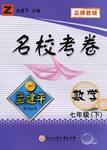题目内容
阅读理解。
McDonald's Corporation (NYSE: MCD) is the world's largest chain of hamburger fast food restaurants,
serving nearly 47 million customers daily 1 Brands (KFC, Taco Bell and others) and sandwich chain
Subway.
In addition to its signature restaurant chain, McDonald's Corporation held a minority interest in Pret A
Manger until 2008, and owned the Chipotle Mexican Grill until 2006 and the restaurant chain Boston Market
until 2007. 2 The corporations' revenues come from the rent, royalties and fees paid by the franchisees, as
well as sales in company-operated restaurants.
3 In response to obesity trends in western nations and in the face of criticism over the healthiness of its
products, the company has modified its menu to include such healthier alternatives as salads, wraps and fruit.
The business began in 1940, with a restaurant opened by brothers Dick and Mac McDonald in San
Bernardino, California. Their introduction of the"Speedee Service System" in 1948 established the principles of
the modern fast-food restaurant. The original mascot of McDonald's was a man with a chef's hat on top of a
hamburger shaped head whose name was "Speedee." Speedee was eventually replaced with Ronald McDonald
in 1963.
The first McDonald's restaurants opened in the United States, Canada, Costa Rica, Japan, the
Netherlands, Germany, Australia, France, El Salvador and Sweden in order of openings. The present
corporation dates its founding to the opening of a franchised restaurant by Ray Kroc, in Des Plaines, Illinois
on April 15, 1955, the ninth McDonald's restaurant overall. 4 Kroc was also noted for aggressive
business practices, compelling the McDonald brothers to leave the fast food industry. The McDonald brothers
and Kroc feuded over control of the business, as documented in both Kroc's autobiography and in the McD
onald brothers' autobiography. 5
serving nearly 47 million customers daily 1 Brands (KFC, Taco Bell and others) and sandwich chain
Subway.
In addition to its signature restaurant chain, McDonald's Corporation held a minority interest in Pret A
Manger until 2008, and owned the Chipotle Mexican Grill until 2006 and the restaurant chain Boston Market
until 2007. 2 The corporations' revenues come from the rent, royalties and fees paid by the franchisees, as
well as sales in company-operated restaurants.
3 In response to obesity trends in western nations and in the face of criticism over the healthiness of its
products, the company has modified its menu to include such healthier alternatives as salads, wraps and fruit.
The business began in 1940, with a restaurant opened by brothers Dick and Mac McDonald in San
Bernardino, California. Their introduction of the"Speedee Service System" in 1948 established the principles of
the modern fast-food restaurant. The original mascot of McDonald's was a man with a chef's hat on top of a
hamburger shaped head whose name was "Speedee." Speedee was eventually replaced with Ronald McDonald
in 1963.
The first McDonald's restaurants opened in the United States, Canada, Costa Rica, Japan, the
Netherlands, Germany, Australia, France, El Salvador and Sweden in order of openings. The present
corporation dates its founding to the opening of a franchised restaurant by Ray Kroc, in Des Plaines, Illinois
on April 15, 1955, the ninth McDonald's restaurant overall. 4 Kroc was also noted for aggressive
business practices, compelling the McDonald brothers to leave the fast food industry. The McDonald brothers
and Kroc feuded over control of the business, as documented in both Kroc's autobiography and in the McD
onald brothers' autobiography. 5
A. McDonald's primarily sells hamburgers, cheeseburgers, chicken products, french fries, breakfast items,
soft drinks, milkshakes and desserts.
B. The site of the McDonald brothers' original restaurant is now a monument.
C. At one time it was the largest global restaurant chain, but it has since been surpassed by multi-brand
operator Yum!
D. Each McDonald's restaurant is operated by a franchisee, an affiliate, or the corporation
itself.
E. The company has also expanded the McDonald's menu in recent decades to include alternative meal
options.
F. Kroc later purchased the McDonald brothers' equity in the company and led its worldwide
expansion and the company became listed on the public stock markets in 1965.
soft drinks, milkshakes and desserts.
B. The site of the McDonald brothers' original restaurant is now a monument.
C. At one time it was the largest global restaurant chain, but it has since been surpassed by multi-brand
operator Yum!
D. Each McDonald's restaurant is operated by a franchisee, an affiliate, or the corporation
itself.
E. The company has also expanded the McDonald's menu in recent decades to include alternative meal
options.
F. Kroc later purchased the McDonald brothers' equity in the company and led its worldwide
expansion and the company became listed on the public stock markets in 1965.
1-5: CEAFB

练习册系列答案
 孟建平名校考卷系列答案
孟建平名校考卷系列答案
相关题目
 dancer.
dancer.